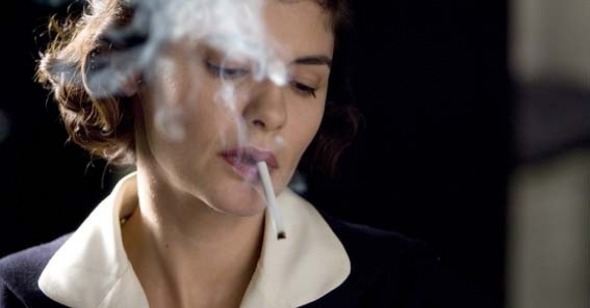Out of Fashion
by Michael Koresky
Coco Before Chanel
Dir. Anne Fontaine, France, Sony Pictures Classics
Following in the footsteps of the unfortunate Jane Austen biopic Becoming Jane, Anne Fontaine’s glossy period piece Coco Before Chanel focuses exclusively on the youthful romances of a fascinating, independent woman in the years before her professional success. For this approach, the intention, or excuse, seems to be that in looking at her origins we will begin to understand the seeds of her artistic temperament, and that this is somehow more valuable than a glimpse into her actual process. Aside from this being a relatively specious, and utterly conventional, approach to hagiography, in each cases it also reduces a real-life woman to a sexist psychological dead end: they become defined only in terms of the men they have loved and lost.
For Anne Hathaway’s teenybopper Jane Austen, it was future politician and judge Thomas Langlois Lefroy who both broke her heart and, sigh, inspired her art. For Audrey Tautou’s gamine incarnation of Coco Chanel (nee Gabrielle), it’s the twinned turn-of-the-century love affairs with high society playboys Etienne Balsan and, especially, Arthur “Boy” Capel that implicitly help push her from impoverished, determined cabaret singer to sad-eyed, disillusioned fashion tycoon. No matter that Chanel’s later life was marked not only by affairs with German officer and Nazi spy Hans Gunther von Dincklage and Igor Stravinsky but also brief imprisonment for war crimes. This portrait of the haute couture artist as a young woman needn’t have delved into her whole life story, but even a brief cataloging of her fascinating accomplishments and deficiencies put Fontaine’s breezy, simplistic portraiture into sharp relief.
As one might expect, Tautou performs the part of the preternaturally steely Coco with forced sullenness; her sparkle dampened, she just comes across as dourly purse-lipped, a prim and proper proto Mary Poppins. After the expected orphanage prologue, complete with poor little Gabrielle being pushed down a gloomy country road in a creaky cart before being abandoned by her father, the film shuttles forward to a teenaged Gabrielle singing “Have You Seen My Coco?” in a Paris tavern, a performance that drives regular customer Balsan (Benoit Poelvoorde) to bestow her nickname. Having learned to sew in the orphanage, however, Coco also works in a tailor’s shop, always adjusting her and sister’s petticoat hems for maximum comfort. The film paints her dislike of corsets and rejection of bustles, frills, and lace as the first indication of her fashionable singularity, yet such details remain mere window dressing for Coco’s induction to high society at the hands of Monsieur Balsan and her eventual transformative love affair with his friend, Chapel (Alessandro Nivola).
Coco explicitly beds Balsan for business connections and muscles her way into his vast countryside estate, where she grows accustomed to the taste of the good life, even if at first he condescendingly keeps her hidden away from his friends during his lavish parties, like a wretch in the attic. Yet when she finally emerges, her skewed but simple and refreshing take on the world entrances not only Balsan and Chapel (at a fancy ball surrounded by flouncing, adorned women, she’s a sensible Jezebel in black) but also their privileged, influential friends, such as the bejeweled and plumed Emilienne, played by Emmanuelle Devos, in the film’s only spontaneous, idiosyncratic performance. Devos’s heavy-lidded, self-effacing confidence provides a key to what’s missing from the rest of the film’s stoic superficiality. During their allegedly passionate romance, Tautou fusses and Nivola preens, the extent of their lovemaking reduced to some dull fondling and close-ups of shirts being unbuttoned—and cut, they’re lying under a sun-dappled tree.
One yearns not for these boring niceties, which feel inevitably like narrative pit stops more than major life events, but for a clear dramatization of Coco’s emergence into the fashion world. Unfortunately, nearly all of this is awkwardly sandwiched into the film’s rushed final five minutes, when we jump ahead decades to survey the unveiling of Coco’s first line of clothes, surrounded by a glistening hall of mirrors, set to Alexandre Desplat’s swoony score, and interspersed with images from the designer’s defining moments of young love. Perhaps it’s inevitable that a crowd-pleaser about the fashion industry would waste much of its time on superficialities, but there’s no excuse for Fontaine’s utter lack of style or distinct individuality.
